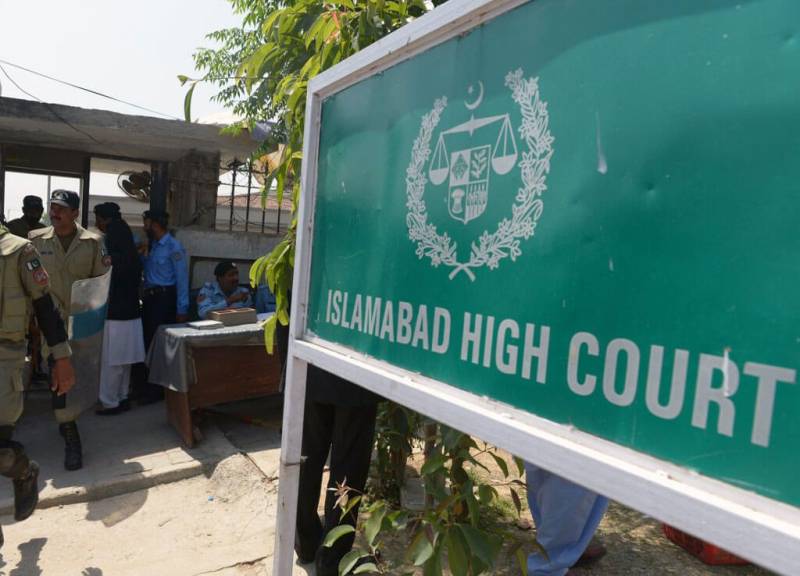
The Press Association of Supreme Court (PAS) and the Islamabad High Court Journalist Association (IHCJA) Thursday jointly challenged a notification by PEMRA, wherein the authority banned coverage of court proceedings and remarks of judges.
Mian Aqeel Afzal and Fiaz Mehmood, the presidents of PAS and IHCJA, respectively, approached the Islamabad High Court (IHC) through their counsel Advocate Umer Gillani, listing the Pakistan Electronic Media Regulatory Authority (PEMRA) and the federal government as respondents.
According to the petition, filed under Article 199, both associations were aggrieved by two letters issued by PEMRA to all licensees, which, in effect, carried purported amendments to the Electronic Media (Code of Conduct) 2015.
The petition claimed that through the notifications, PEMRA had imposed a blanket ban on the live coverage of statements issued in open court by various actors of the justice system, including judges, lawyers, parties and witnesses.
"By imposing a blackout on court proceedings without even consulting the judiciary, PEMRA is effectively committing an assault on the independence of the judiciary, in addition to violating the public’s right of access to information, journalists’ freedom of speech and litigants’ right to a fair trial," the petition contended.
It was argued that the notifications were procedurally defective and thus liable to be set aside.
"Last but not least, the notifications, which sound a death knell for the profession of courtroom journalism, have jeopardised the right to livelihood of the members of the petitioners’ organisations and amount to a violation of their rights under Article 18 of the Constitution," the petition maintained.
The letters referred to in the petition include one issued by PEMRA on May 21 titled “Directives – Discussions on Sub-Judice matters” to all satellite TV Channel Licencees.
The letter was followed by a corrigendum, which made only minor changes to the first letter.
The petition said the letters began by mentioning Rule 4 of the Electronic Median (Programmes and Advertisements) Code of Conduct, 2015. The rule permits the live reporting of court proceedings and does not impose any blanket ban, the petition stated. It added that the letter relied on a judgement by the Supreme Court from 2018 in a suo moto case to change this rule.
"It is important to bear in mind that the said judgment also did not impose a blanket ban on live reporting of court proceedings," the petition states, adding,
"It is a fact that in the seven years which have passed since the pronouncement of that judgment by the Supreme Court, live reporting (Television Tickers and Headlines) have continued unhindered."
"It is interesting to note that the first letter of 21st May did not contain any exclusion clause regarding live broadcasts. This was added through the second letter issued on the same day. This in itself shows the arbitrary and capricious manner in which PEMRA is dealing with this issue, which is most sensitive in terms of independence of the judiciary as well as media freedom."
The petition said that after the issuance of notifications, Show Cause Notices (SCNs) were issued to various channels for allegedly continuing to provide live coverage of court proceedings.
"In the wake of the issuance of SCNs to Licencees, there is now an imminent threat to the livelihood of courtroom journalists."
The petition said that many of these journalists had spent the first two decades of their careers covering the courts; but now they were at the risk of being rendered redundant because of the media blackout being imposed on coverage of court proceedings by PEMRA.
It stated that the notifications do not specify exactly what set of facts prompted the PEMRA chairman to issue the notice at this particular point in time.
"It seems probable that this assault on judicial independence and media freedoms was prompted by the recent live coverage of the case of an eminent poet who has been subjected to enforced disappearance," the petition argued, noting that in the case, the court, faithful to its oath to defend fundamental rights, took stern notice of the habeas petition filed for his recovery.
The live reporting of those proceedings drew considerable public attention, which might have made certain cogs in the state machinery uncomfortable, resulting in the issuance of the present illegal and arbitrary notifications."
The petition further contended that PEMRA's notifications were tantamount to arbitrarily and summarily amending the Electronic Media (Programmes and Advertisement) Code of Conduct 2015, adding that there is a step-wise procedure to arrive at a decision to issue such notifications but it seems this was not followed as it was effected through a corrigendum.
"It appears that there was no meeting of the authority at all to consider the matter. The impugned notifications were passed upon the instruction of the chairman acting alone, who, in turn, was doing the government’s bidding."
It further argued that the authority lacks the mandatory number of members to make the changes, adding that the notifications have been issued by a forum that is not properly constituted.
Furthermore, the petition pointed out that Article 3(3) of the code expressly prohibits the airing of statements of the members of proscribed organisations, the petition said.
"But no such blanket prohibition can be found anywhere for statements made by judges and lawyers during court proceedings," it pointed out.
"By applying the same rule on the statements of judges and lawyers, which is applicable to terrorists, PEMRA is violating its own Code of Conduct. And the element of contempt in this equation is also hard to miss."
The petitioners requested the high court to declare the notifications illegal and unconstitutional.

